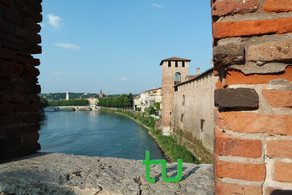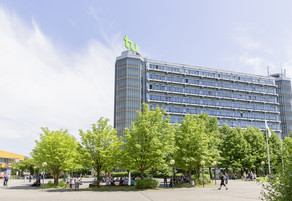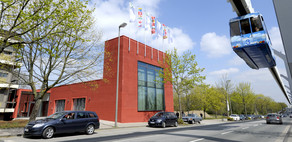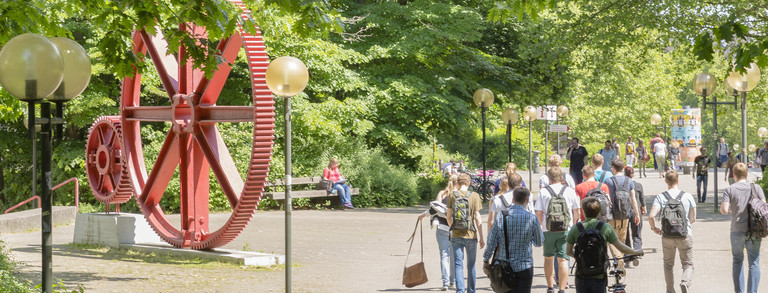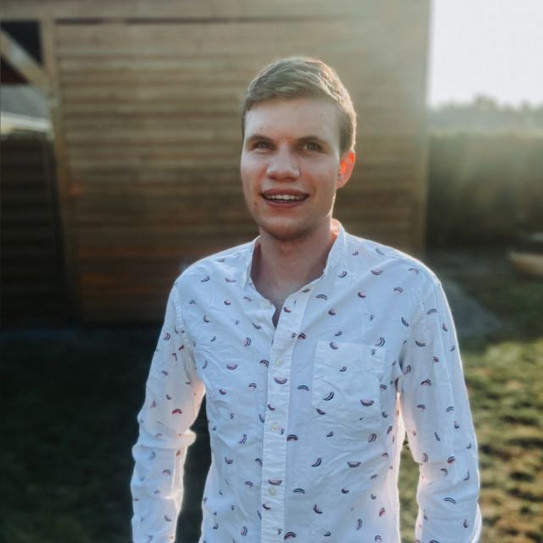Erasmus+ Semester Abroad with a Disability: Interview with Max Grote
- News Internationales
- Outgoings
You are wondering whether a stay abroad is also possible with a disability: Max Grote says yes and reports here about his experience! The blind student spent an Erasmus+ study abroad in Athens in 2019 and explains why he had no significant difficulties abroad despite his impairment.
Max Grote is a student of Applied Linguistics who spent the Summer semester 2019 in Greece at the National and Kapodistrian University of Athens. He cannot see and yet did not shy at spending time abroad. The special funding from the German Academic Exchange Service (DAAD) for opportunity-oriented mobility in the Erasmus+ program makes a lot possible.
His recommendation for all students who are unsure about going abroad because of their impairment: "Just do it!" He has never felt alone because, just like in his home country, there are nice people in every other country who are always ready to help. He had also spent almost one year abroad before this stay during his studies. Here you can get a better insight into Max's semester abroad.
Athens offers so many reasons for a visit. Whether it is the culinary specialties, the beautiful Greek weather or the super nice people - I can confirm everything after my stay. Of course, there were also professional and personal reasons for me: A semester abroad is mandatory in my degree program. This was not an additional hurdle for me, but a big plus, because it was already clear to me that I would like to go abroad during my studies - so it was a win-win situation. In regard to my studies, the content and seminars that I discovered on the website of the Kapodistrian University of Athens also fit very well with what I had already done and still wanted to do. Last but not least, I had already met a few people from there through European-international projects I had helped organize as part of the Erasmus+ program.
Before I started my studies, I had already been abroad for almost a year after graduating from high school. I did a European Voluntary Service (now called European Solidarity Corps) at VIEWS International, an organization in Liège in the heart of the French-speaking part of Belgium. I met a lot of people from all over Europe at international youth encounters, meetings, seminars and trainings and had a very nice time there. During this time I learned to appreciate and love the European social cohesion and the unbelievable diversity of our cultures. Besides my office work on translations (English-French and French-English), the website, articles for the newsletter, etc., I was involved in international, mostly inclusive (youth) projects as activity leader, organizer, facilitator and co-developer. This great experience was definitely also a strong reason for wanting to have another great experience abroad.
Just do it! There is so much to gain, to learn, to experience and to discover, that no barrier outweighs. In general, I always think that it helps not to be too afraid of possible limits, but much more to just try out what else is out there and what else is possible. A lot is possible, even if you think it's difficult. Besides, you can find difficulties everywhere, even in your own country - and elsewhere there are just as many super nice people who are happy to help you if you ask nicely, people who are super open. And if you approach these people with the same openness, there is a lot to discover, which is always a mega experience and is different everywhere. In addition, you are never alone in your home country. At TU Dortmund University, for example, there is the International Office, which helps in all details and brings you super nice and relaxed through the paper jungle, which such an Erasmus stay entails. For the more specific concerns, there are also the people from the DoBuS, who support you with their expertise, advice and action, so that everything runs smoothly. If there are special, individual difficulties or needs, a compensating solution will be found in any case, don't worry. In Athens at the university, I had even two buddies assigned to me through the very active European Student Network there: A sighted fellow student from my field, who was able to answer many questions for me, especially in the beginning, and one who studied something different, but was blind like me and thus knew what was going on in all more specific concerns. The University of Athens also did a very good job, so I can only recommend it in this respect. Of course, other universities in Europe are also at least cooperative and open to you, so just do it - everything will be fine.
The culture definitely met my expectations. The people there were all super nice, open-minded and loving. Of course, there are clichés to every culture, some of them are of course not without reason - for example, that of the really very good (but of course also very meat-heavy) Greek food, there are really very, very tasty delicacies to discover - the typical (olives, feta or of course souflaki and gyros - not only on the spit but also as a snack in the pita bread with chips, tzatziki / sauce and salad) or homemade dishes like kokkinisto (super delicious! try it when you are there and think of me). In the university there was of course also something to eat in the canteen - at noon and in the evening there were warm dishes, with a Mensacard everything was inclusive. But: the Germanized combination menu of gyros with rice and tzatziki does not exist in this form in Greece. Even before my semester abroad, Greek students regularly received culture shocks and uncomprehending looks when it was served to them as typical Greek food elsewhere. And the liquid treasures of the country - whether olive oil or rather wine and Ouzo - are of course worthwhile. Nevertheless, it would be wrong to reduce this beautiful country to culinary clichés, historical sites or the history of the ancient Greeks including the invention of democracy - of which the Greek people are proud, of course. Above all, it is these people who have remained in my memory, who have made my stay abroad what it was and whom I have all taken to my heart. For that alone, such an experience is already worthwhile. And yes, the cliché is often true that many of them are very temperamental and emotional, but at the same time approach many things in a more relaxed and simply less uptight or closed - sometimes we should learn a lesson from that. Despite all this, every cliché has its gaps for diversity. For example, there is of course the typical Greek music with pouzouki, which is probably all too stereotyped when you think of Greece. On the other hand, there is just as much pop music in Greek. In the last few years, trap has also become very popular there, and the Erasmus students have also sung along or tried it at some point. Greek culture is definitely very diverse, there's a lot to discover and of course also things you could learn from. As a fan of languages, it was of course also a great opportunity for me to get to know the Greek language and to practice it directly in many conversations. In Germany I often get to hear that it sounds a bit like Spanish - but maybe it just sounded a bit fishy ...
There would be much more to tell - about traditional holidays, peculiarities, beautiful and also unusual customs and much more, but it is much nicer to experience it all by yourself than just read about it. So, what are you waiting for?
Cultural and linguistic misunderstandings naturally always arise when different cultures or languages meet. They usually cause confusion at first and then end up with everyone laughing their heads off. There was a linguistic misunderstanding in English already in my first days: I was new in the seminar and a very sympathetic student approached me to find out who I was. In our conversation, she asked me, "How did you come to Greece?". What she really wanted to know was: How come you are in Greece? Why did you choose it? What I understood from the wording: How did you travel to Greece? My answer was short and direct: by plane. She was already thinking: oh dear, that's it for the conversation. But we were able to clarify this misunderstanding very quickly, and since then we have always laughed when we think back to our first meeting.
Max Grote definitely gained unforgettable experience during his stay abroad with Erasmus+. Do not miss this opportunity during your studies and apply for one of the many possibilities to go abroad!
By the way, Max Grote is also passionate about music and has recently released a new single. Feel free to listen to the artist's music on Spotify or YouTube!


![Eat & Read [Translate to English:]](/storages/international/r/Bilder/Veranstaltungen/Eat___Read/waffel_plain_buecherturm.jpg)



